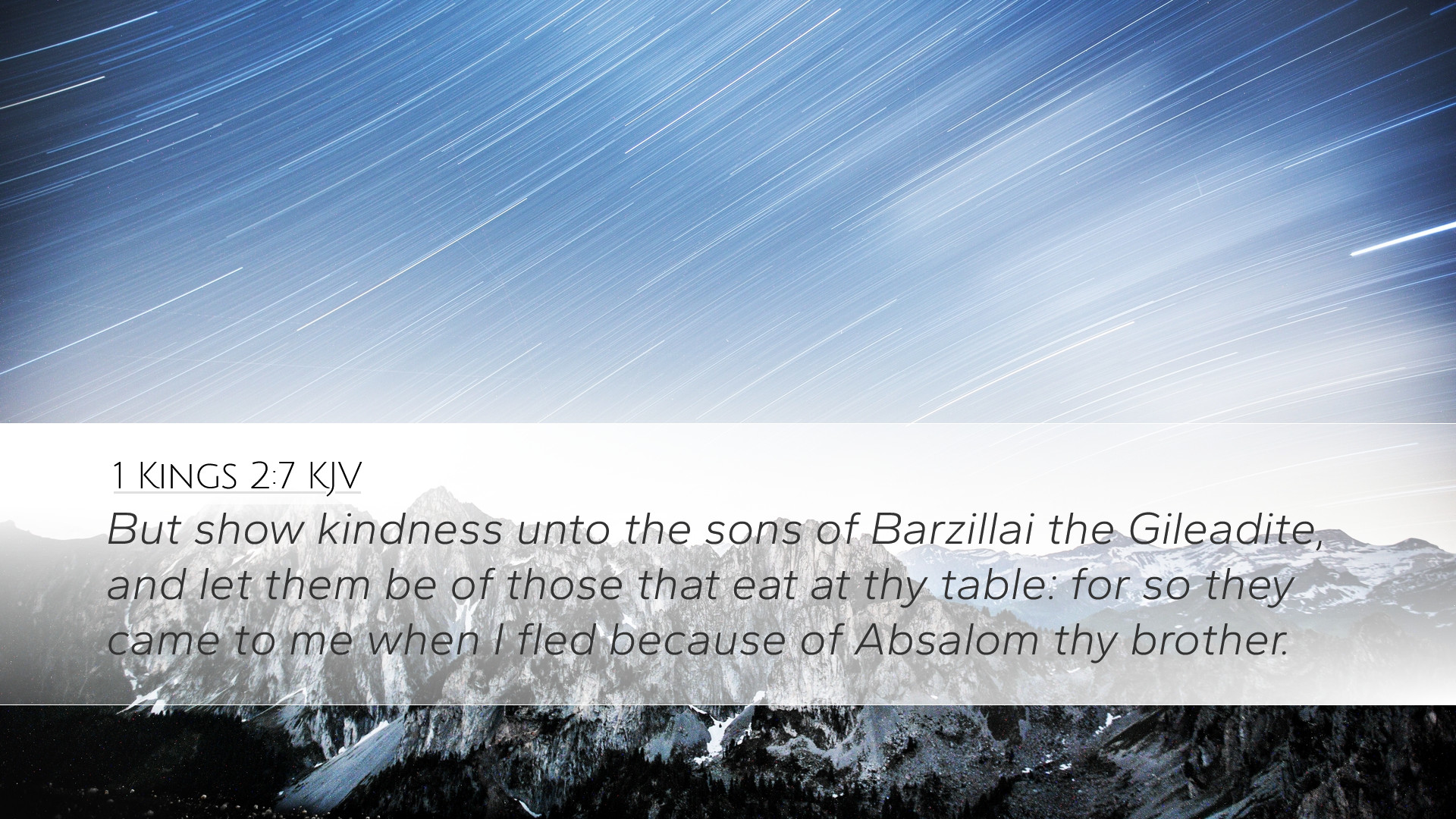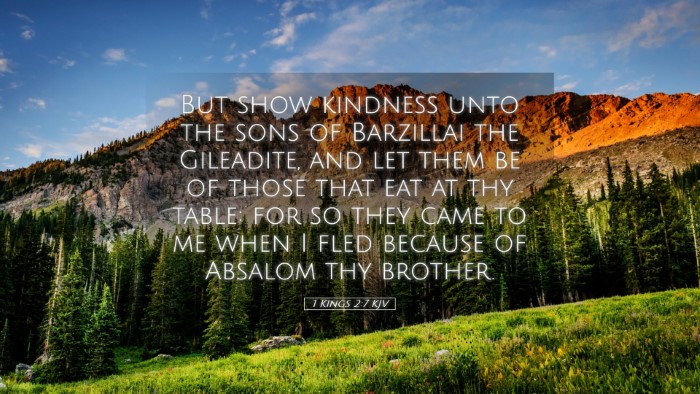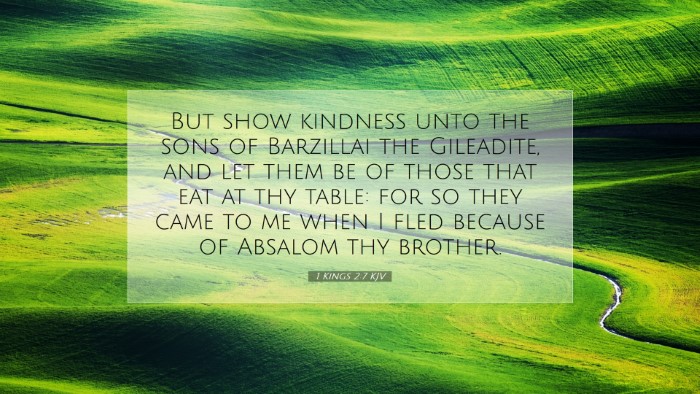Commentary on 1 Kings 2:7
1 Kings 2:7 (KJV) states, "But show kindness unto the sons of Barzillai the Gileadite, and let them be of those that eat at thy table: for so they came to me when I fled because of Absalom thy brother." This verse is pivotal in understanding King David's sentiments towards loyalty, gratitude, and the importance of remembering those who have supported us in times of crisis.
Contextual Background
The historical context of this verse is crucial. David, at this point, is transitioning the throne to his son Solomon, amidst the tribulations of Absalom’s rebellion. Barzillai the Gileadite supported David during his flight from Absalom, providing sustenance and refuge. This act of kindness during a time of distress left a lasting impression on David, as he emphasizes loyalty and gratitude through his instructions.
Insights from Matthew Henry
Matthew Henry speaks eloquently about the character of Barzillai, noting that he represents true loyalty and support. In his commentary, he emphasizes:
- Importance of Gratitude: Henry highlights that David’s remembering of Barzillai exemplifies a king’s duty to reward loyalty. Gratitude is not just an emotion but an action manifested through kindness.
- Generosity towards Others: He suggests that David’s command to let Barzillai's sons eat at the king’s table signifies that the benefits of association with the king extend to their families, highlighting a culture of honor and reward.
- Legacy of Kindness: This act serves as a reminder of the legacy one leaves behind. Henry emphasizes that kindness, when acknowledged and reciprocated, fosters enduring relationships that can outlive the giver.
Insights from Albert Barnes
Albert Barnes provides a detailed analysis of the social and political implications of David’s request. His key points include:
- Recognition of Support: Barnes notes that acknowledging the ones who stood by in times of trouble is a hallmark of wise leadership. David’s actions set a precedent for future rulers about the significance of support from loyal subjects.
- Political Strategy: Recognizing Barzillai’s sons at the royal table was also a shrewd political move. It solidified alliances and fostered goodwill. Barnes encourages readers to see value in building relationships based on mutual support and respect.
- Covenant Relationships: Barnes expands on the idea of loyalty and covenant, stressing that the loyalty displayed by Barzillai, in the face of adversity, is a reflection of a deeper covenant relationship with God’s anointed. This speaks to the idea that loyalty should be inherent in the followers of God's chosen leaders.
Insights from Adam Clarke
Adam Clarke provides a comprehensive examination of Barzillai and the nature of his support for David. Clarke states:
- Barzillai’s Character: Clarke describes Barzillai as a venerable figure, representing wisdom and integrity. He interprets David’s recognition as not merely a political maneuver but a genuine acknowledgment of virtuous conduct.
- Encouragement for Loyalty: Clarke emphasizes that David’s act serves as an encouragement to others who might be in positions to assist their leaders. It reaffirms that such loyalty will not go unrecognized or unrewarded.
- Living Out Legacy: Clarke draws attention to the legacy of kindness. He argues that the kindness shown to Barzillai will position Solomon as a wise leader who understands the value of honoring others, thereby modeling a system of grace and fidelity.
Theological Implications
1 Kings 2:7 invites a deeper reflection on the nature of loyalty, gratitude, and the pursuit of justice. The theological implications extend into several areas:
- God’s Faithfulness: The passage illustrates God's faithfulness to those who serve and support His anointed. It serves as a reminder to the faithful that acts of kindness are perceived and recorded by God.
- Community and Kinship: The act of inviting Barzillai’s sons to dine with the king implies a deep sense of community. The Church is called to be a community where members support one another and express gratitude for each other’s contributions.
- Leadership Qualities: This passage lays down qualities essential for leaders: recognizing the contributions of others, being generous, and actively building a community unified by loyalty and mutual respect.
Conclusion
In conclusion, 1 Kings 2:7 serves as a rich source of insight for pastors, students, theologians, and Bible scholars. It intricately weaves together themes of loyalty, gratitude, and community. The diverse insights garnered from Public Domain Commentaries provide a robust understanding of the passage, encouraging us not only to appreciate the kindness shown to us but also to embody the spirit of generosity and acknowledgment in our relationships. As we reflect on the legacy of King David, may we be inspired to foster a culture of honor and gratitude, ensuring that our actions reflect the same loyalty and kindness exhibited by Barzillai.


